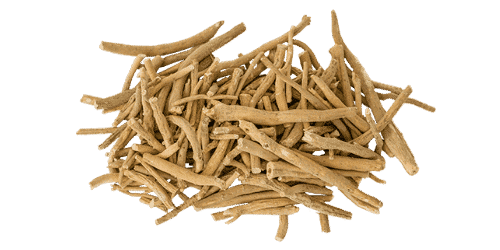
Origin
Originating from India, ashwagandha is also called “winter cherry” or “Indian ginseng” due to its phytotherapic properties similar to those of panax ginseng. In ayurveda, it has been used for 3000 years for regenerating the body.
Did you know?
In sanskrit, the word ashwagandha literally means “the smell of a horse”. This name comes from, on the one hand, its particular horse-like odour, and on the other hand, that it is said to confer the power of a horse.
Characteristics
Ashwagandha is a small shrub that generally does not exceed 80 cm in height. It has oval leaves roughly ten centimetres long, covered in widely spaced coarse hair, small white flowers, and small red fruits in the form of berries. But the riches of ashwagandha are above all found in its roots since it is mainly the roots that are dried and ground into powder for use in phytotherapy. The leaves and the berries are also used but less frequently.
Flowering and harvesting
The plant grows in the sun in sandy soils, it therefore only needs very little water and is well adapted to subtropical zones. It can be cultivated at an altitude of up to 1200 metres. Ashwagandha produces small white flowers which themselves produce small red fruits at the end of the summer. The roots of ashwagandha are long and tuberous. They can measure up to 30 cm in length and have a bitter taste. The entire plant is uprooted to recover the roots so that they can be ground into powder.
Benefits
The plant is composed of several substances such as flavonoids, iron, potassium, as well as fatty acids.1
Ashwagandha:
- Helps to reduce anxiety and stress2
It is an “adaptogen” plant with soothing properties which helps to reduce temporary or chronic stress and the harmful effects it has on the body. The plant also helps to combat sleeping problems associated with anxiety.
- Combats cellular ageing2
The antioxidant properties of ashwagandha help to combat cellular ageing by eliminating free radicals found in the body. This plant is therefore naturally anti-ageing.
1https://www.mesbienfaits.com/ashwagandha/
2https://www.santescience.fr/ashwagandha/
